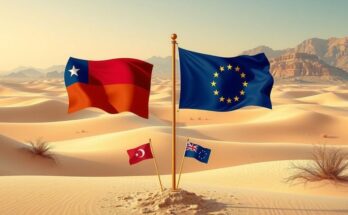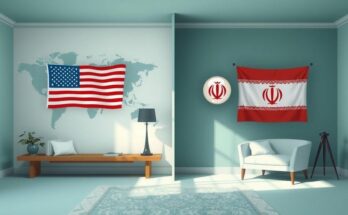The article discusses the similarities and differences between the conflicts in Palestine and Kashmir, informed by recent statements made by Pakistan’s Prime Minister at the UN. It highlights the colonial legacies affecting both regions, the geopolitical dynamics at play, particularly US involvement in the Middle East, and the contrasting international support they receive. The commentary also touches on India’s diplomatic actions regarding Kashmir and the implications of regional conflicts, especially the situation in Lebanon.
In light of recent comments made by Pakistan’s Prime Minister at the United Nations, the parallels drawn between the situations in Palestine and Kashmir deserve a more nuanced analysis. While both conflicts stem from colonial legacies, their historical and political contexts differ significantly. The establishment of Israel in 1948 coincided with the beginning of the conflict over Kashmir, providing a common thread rooted in colonial cynicism, which has led to the suffering of both peoples due to unfulfilled rights as outlined by United Nations resolutions. The ongoing military tensions between India and Pakistan concerning Kashmir have predominantly resulted in stalemates, excluding the unique circumstances of the 1971 war. In contrast, the Palestinian struggle remains actively unresolved, gaining momentum over decades. The Kashmir conflict was largely frozen after the Simla Agreement in 1972 until the resurgence of armed resistance in 1989, igniting critical international discussions regarding nuclear risks in South Asia. Unlike Kashmir, which saw support from Western powers, the Palestinian cause found backing from the former USSR. The geopolitical dynamics have drastically evolved post-Cold War, with the Middle East suffering grave consequences from US-led interventions targeting former Soviet allies, resulting in the destabilization of nations such as Syria, Libya, and Iraq. In comparison, India navigated these dynamics without facing a similar upheaval, securing a unique position in the region as an ally of the West. The discourse at the UN reflects Pakistan’s efforts to gain international support regarding Kashmir. However, these efforts clash with India’s own diplomatic maneuvering, as exemplified by guiding foreign diplomats through elections in Jammu and Kashmir, which serves to ‘internationalize’ its sovereign claims. The vigilance of Western intelligence capabilities over the region, particularly in the context of Israel’s security concerns, starkly contrasts the situation in Kashmir, highlighting the global power play in contemporary conflicts. The recent events surrounding the escalating violence in Lebanon illustrate the complexities of these interwoven conflicts, emphasizing that without decisive intervention, the situation may deteriorate further. Moreover, the fate of Hezbollah and its ongoing resilience in the face of external threats further complicates regional dynamics, affirming Iran’s role in supporting its allies while maintaining strategic interests.
This article examines the ongoing conflicts in Palestine and Kashmir, illustrating their historical backgrounds, geopolitical significance, and the implications of international relations. The author highlights critical events such as the creation of Israel, the partition of India, and subsequent military engagements that have shaped each region’s contentious atmosphere. Additionally, the commentary explores the contrasts in foreign support for both causes and how shifting global alliances have influenced the trajectory of these long-standing disputes.
In summary, while there exist superficial similarities between the conflicts in Palestine and Kashmir, the discrepancies in their historical contexts, international support, and geopolitical dynamics are pronounced. The situations present complex narratives that require careful consideration beyond mere analogy. The evolving conflicts underscore the urgency for intervention to prevent further deterioration, particularly as regional powers navigate their strategic interests amidst these enduring struggles.
Original Source: clarionindia.net




